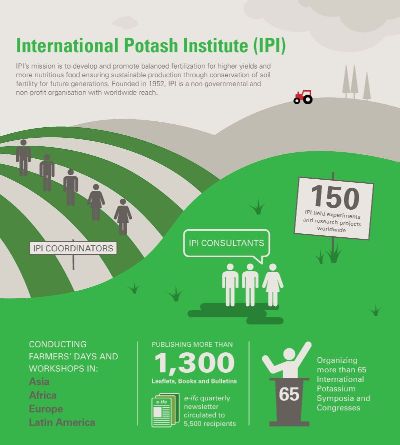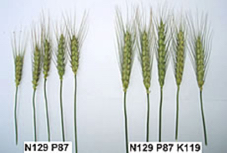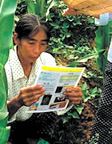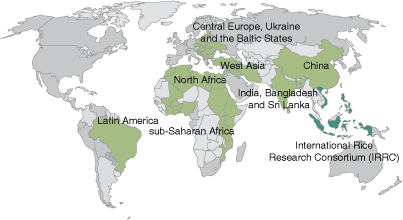The International Potash Institute and Agriculture Today
Farmers today are faced with the challenge of meeting an ever-increasing demand for a wide range of high quality, safe foods. But these demands must be satisfied in economically viable ways whilst safeguarding natural resources and protecting the environment.
The International Potash Institute (IPI) aims to help farmers, and those who advise them, to respond to these challenges by:
- Contributing to the maintenance of soil fertility and the production of nutritious food by conducting related applied research and educational programmes.
- Disseminating and transferring the knowledge available on the effects of potassium (K) in soils and its impact on yield, quality and stress tolerance in plants.
- Collecting, analyzing and sharing the results and information on the effects of balanced fertilization to optimize the use of plant nutrition.
We have produced the IPI profile infographic to give a quick overview of the work of the IPI, and how it achieves it mission.

The Issue: Do Crops Get Sufficient K?
During rapid vegetative growth, most crops contain more K than nitrogen (N). Yet incipient deficiency symptoms are difficult to recognize and can be confused with N deficiency.
What is the K Balance for a Cropping System? (i.e. K Applied Minus K Removed)
For many situations, evidence suggests that the K balance is negative because insufficient K is being applied in mineral fertilizers or is available from organic residues and organic manures. A continuing negative K balance leads to loss of soil fertility and the inefficient use of other costly inputs like N. If the K balance for a field is negative - do not rely on a sufficiently rapid release of K from soil reserves to get optimum yields.

Potassium in Human Health and the Environment
Potassium in drinking water and food is beneficial for human health. It helps maintain the ionic balance in cells and can help in the treatment of hypertension.
Potassium has no known detrimental effect in the environment. It is not lost to the atmosphere and if transported to rivers and lakes it does not induce the adverse effects of eutrophication. Any K leached from surface soil may be held in the subsoil where it can be available to deep-rooted crops.
Potassium in Plant Nutrition
Potassium (K) (often referred to as potash, K2O) is an essential nutrient for all living organisms. It has a vital role in plant metabolism, growth and adaptation to stress. Adequate amounts of K must be available in the soil for its uptake by roots to ensure that crops achieve economic yields of acceptable quality.
Roles in plant nutrition that rely solely on K include enzyme activation and protein synthesis. No K, no growth!
Roles in which the plant prefers to use K and for which large amounts are required include:
- Maintaining cell turgor (rigidity). Maximum dry matter production requires optimum leaf area to intercept solar radiation (sunlight) to provide the energy to convert carbon dioxide (CO2) to sugars. Optimum leaf area is driven by nitrogen (N) supply, and rapidly expanding cells require K to obtain water and maintain their turgor.
- Regulating the water content of plants.
- Opening and closing stomata. These are the openings in leaves through which water is lost by transpiration and CO2 enters to be converted to sugars.
- Transporting sugars produced in the leaves to storage organs like grain, tubers and roots. K is an essential component of the molecular pump within cell membranes that facilitates the passage of sugar molecules through the innumerable membranes during the transport process.
- Enhancing the natural ability of plants to combat stress from drought and cold, pest and disease.
Teaching Farmers the Value of K
Worldwide, many ongoing field experiments and demonstration plots are executed each year, together with dozens of seminars, workshops and farmers' days. International symposia are conducted regularly in various countries where we operate, all these to demonstrate the special effect and role of potassium in optimized crop nutrition.
IPI makes a major investment in reaching out to farmers, their suppliers and advisors. We believe in field-level promotion and outreach to farmers as well as in fundamental and applied research. IPI works hand-in-hand with organisations that include extension services, universities and those willing to take part in farmers' gatherings, field days, open seminars, training courses and other learning-related activities.

IPI Foundation and Coordinators
IPI is a non-governmental and non-profit organization based in Zug, Switzerland. Founded in 1952 by German and French potash producers, it is now supported by potash producers in Europe and the Near East.
IPI is governed by a Technical Secretariat and Board which convene several times each year. A major part of IPI’s work is carried out by its team of field agronomists, or coordinators, who work closely with researchers, government offices, extension and agribusinesses around the world.
IPI’s mission is to develop and promote balanced fertilization for higher yields and more nutritious food, ensuring sustainable production through the conservation of soil fertility for future generations.
Countries in Which IPI is Active:
|
|
|
|
|
